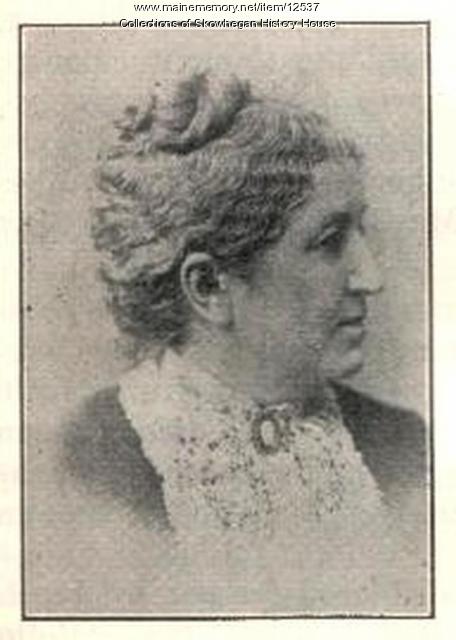Keywords: Academy journal
- Historical Items (7)
- Tax Records (0)
- Architecture & Landscape (0)
- Online Exhibits (16)
- Site Pages (16)
- My Maine Stories (1)
- Lesson Plans (0)
Online Exhibits
Your results include these online exhibits. You also can view all of the site's exhibits, view a timeline of selected events in Maine History, and learn how to create your own exhibit. See featured exhibits or create your own exhibit
Exhibit
Student Exhibit: Rebecca Sophie Clarke
Sophie May, whose real name was Rebecca Clarke, was the author of over 40 books between 1861 and 1903. She wrote the "Little Prudy Series" based on the little town of Norridgewock.
Exhibit
Harry Lyon: An Old Sea Dog Takes to the Air
Through a chance meeting, Harry Lyon of Paris Hill became the navigator on the 1928 flight of the Southern Cross, the first trans-Pacific flight. His skill as a navigator, despite his lack of experience, was a key factor on the flight's success.
Exhibit
Drawing Together: Art of the Longfellows
Henry Wadsworth Longfellow is best know as a poet, but he also was accomplished in drawing and music. He shared his love of drawing with most of his siblings. They all shared the frequent activity of drawing and painting with their children. The extended family included many professional as well as amateur artists, and several architects.
Exhibit
MHS in Pictures: exploring our first 200 years
Two years after separating from Massachusetts, Maine leaders—many who were part of the push for statehood—also separated from Massachusetts Historical Society, creating the Maine Historical Society in 1822. The legislation signed on February 5, 1822 positioned MHS as the third-oldest state dedicated historical organization in the nation. The exhibition features MHS's five locations over the institution's two centuries, alongside images of leaders who have steered the organization through pivotal times.
Exhibit
A City Awakes: Arts and Artisans of Early 19th Century Portland
Portland's growth from 1786 to 1860 spawned a unique social and cultural environment and fostered artistic opportunity and creative expression in a broad range of the arts, which flowered with the increasing wealth and opportunity in the city.
Exhibit
In Time and Eternity: Shakers in the Industrial Age
"In Time and Eternity: Maine Shakers in the Industrial Age 1872-1918" is a series of images that depict in detail the Shakers in Maine during a little explored time period of expansion and change.
Exhibit
Port of Portland's Custom House and Collectors of Customs
The collector of Portland was the key to federal patronage in Maine, though other ports and towns had collectors. Through the 19th century, the revenue was the major source of Federal Government income. As in Colonial times, the person appointed to head the custom House in Casco Bay was almost always a leading community figure, or a well-connected political personage.
Exhibit
Westbrook Seminary: Educating Women
Westbrook Seminary, built on Stevens Plain in 1831, was founded to educate young men and young women. Seminaries traditionally were a form of advanced secondary education. Westbrook Seminary served an important function in admitting women students, for whom education was less available in the early and mid nineteenth century.
Exhibit
2009 marked the bicentennials of the births of Abraham Lincoln and his first vice president, Hannibal Hamlin of Maine. To observe the anniversary, Paris Hill, where Hamlin was born and raised, honored the native statesman and recalled both his early life in the community and the mark he made on Maine and the nation.
Exhibit
Dressing Up, Standing Out, Fitting In
Adorning oneself to look one's "best" has varied over time, gender, economic class, and by event. Adornments suggest one's sense of identity and one's intent to stand out or fit in.
Exhibit
CODE RED: Climate, Justice & Natural History Collections
Explore topics around climate change by reuniting collections from one of the nation's earliest natural history museums, the Portland Society of Natural History. The exhibition focuses on how museums collect, and the role of humans in creating changes in society, climate, and biodiversity.
Exhibit
The Sanitary Commission: Meeting Needs of Soldiers, Families
The Sanitary Commission, formed soon after the Civil War began in the spring of 1861, dealt with the health, relief needs, and morale of soldiers and their families. The Maine Agency helped families and soldiers with everything from furloughs to getting new socks.
Exhibit
Summer Folk: The Postcard View
Vacationers, "rusticators," or tourists began flooding into Maine in the last quarter of the 19th century. Many arrived by train or steamer. Eventually, automobiles expanded and changed the tourist trade, and some vacationers bought their own "cottages."
Exhibit
The history of the region now known as Maine did not begin at statehood in 1820. What was Maine before it was a state? How did Maine separate from Massachusetts? How has the Maine we experience today been shaped by thousands of years of history?
Exhibit
Begin Again: reckoning with intolerance in Maine
BEGIN AGAIN explores Maine's historic role, going back 528 years, in crisis that brought about the pandemic, social and economic inequities, and the Black Lives Matter movement in 2020.
Exhibit
Washington County Through Eastern's Eye
Images taken by itinerant photographers for Eastern Illustrating and Publishing Company, a real photo postcard company, provide a unique look at industry, commerce, recreation, tourism, and the communities of Washington County in the early decades of the twentieth century.
















